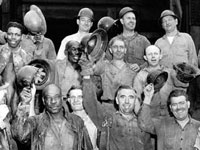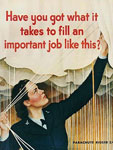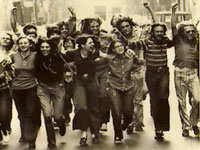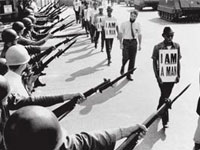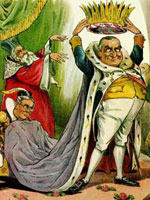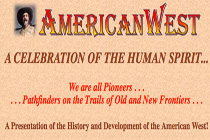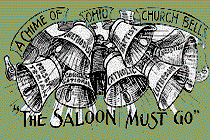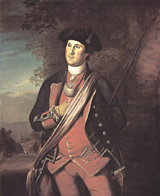Rock Paper Scissors
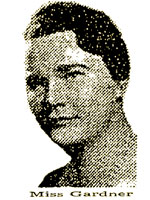
Is the Rochambeau game (rock-paper-scissors) named after the French army general who served during the American Revolution?
Maybe, but in a roundabout way.
You will probably not be surprised to learn that this question is apparently not something that has elicited a lot of serious historical research up to now ("Where do I find historical evidence for a simple game played by children that requires no equipment?" and "Will I hurt my chances for tenure if I spend much time researching such a seemingly trivial subject?"), so I will have to go out on a limb here with my own theory, which is based only on circumstantial evidence. Because this is just my theory, I am going to have to explain how I arrived at it.
First, a confession: Although I began playing rock-paper-scissors when I was a child, I had never heard it called "Rochambeau" until you sent in your question. Asking around, however, I discovered that some of my colleagues, raised in various places around the country, had vaguely heard of "Rochambeau," but with some of them I was not able to figure out if they had definitely called the game of rock-paper-scissors "Rochambeau" when they were younger, or whether they had merely watched a certain South Park episode in which Eric Cartman challenged another child to play "Rochambeau," but which he explained as consisting in a kind of duel carried out by kicking each other (Google "Rochambeau" and "South Park" to find a link to the clip, but I hereby give you a "language warning" for this).
Nevertheless, more Googling makes it clear that "Rochambeau," used for rock-paper-scissors, has an older and wider provenance. Mathematicians and evolutionary biologists, for example, who have recently become interested in "multivariant" selection systems over the past 20 years or so, have written about rock-paper-scissors and have typically cited the game as "rock-paper-scissors" and then added "Rochambeau" or "Roshambo" in parentheses after it. So that carries the word back at least a couple of decades.
As an illustration of the severe limits on using Wikipedia for research, the English-language Wikipedia entry on rock-paper-scissors (or rock-scissors-paper, etc.) says that the game is called "Rochambeau" in French. But the French-language Wikipedia entry on the game lists the Francophone countries' names for it as: pierre-feuille-ciseaux, papier-caillou-ciseaux, roche-papier-ciseaux, pierre-papier-ciseaux, and feuille-caillou-ciseaux. It then says that the game is called "Rochambeau" in the United States. I wondered whether "Rochambeau" might be an English-language corruption of a French triplet beginning with "roche" (rock), but I have nothing else to offer in this speculative vein, so this is not part of my theory.
Next up was to consider the alleged connection with the Comte de Rochambeau, the French general who was a hero of the American Revolution.
Over the past decade, rock-paper-scissors has become a quasi-formally organized sport with international tournaments. Two American brothers, Douglas and Graham Walker, organized the World RPS Society, with tournaments, a website, t-shirts, and posters, and they have also published a light-hearted guide to playing "professional" rock-paper-scissors, which includes a brief and half-serious history of the game. Their Official Rock Paper Scissors Strategy Guide (2004) offers one theory about how the game became "synonymous with" the Comte de Rochambeau:
"It is widely believed that an ill-advised throw of Scissors (or Ciseaux) resulted in his being uprooted from his ancestral home to become the marshal of the French forces during the American Revolution. His arrival is widely credited with the introduction of RPS to the United States."
But this is all unlikely. Rochambeau (and Lafayette and other French military officers) were quite eager to come to America to fight with the Americans, and had to resist others' efforts to keep them in France so that their military experience would not be missed there.
Another mention of the supposed historical connection with Rochambeau is in physicist Len Fisher's Rock, Paper, Scissors: Game Theory in Everyday Life (2008):
"George Washington is reputed to have played it with Cornwallis and the Comte de Rochambeau to decide who would be the last to leave Cornwallis's tent after the signing of the British surrender at Yorktown in 1781. (The story goes that Rochambeau won, which is why the game is still called Ro-Sham-Bo in some quarters.)"
But Washington, Rochambeau, and Cornwallis did not negotiate surrender terms together in a tent; nor did they even meet together on that occasion. Cornwallis sent Washington a message under a flag of truce, proposing a cessation of hostilities so that officers appointed by each side could meet and "settle terms of the posts at York and Gloucester." After speaking with his own staff and with Rochambeau and his officers, Washington responded in writing that he wished to see Cornwallis' proposed terms of surrender before he could agree to the talks. Cornwallis sent back another written message to Washington, listing his terms. Washington then decided that he could not accept the terms as written, but that they were enough to begin negotiations, so he agreed to the ceasefire and to send representatives to the Moore house on the York River behind the Americans' lines, where Cornwallis had proposed the meeting take place.
The officers who met for negotiations the following day included Lieutenant-Colonel John Laurens, a native South Carolinian, who had previously been Washington's aide-de-camp, and (for Rochambeau) Colonels Louis Marie Antoine vicomte de Noailles (Lafayette's brother-in-law), and Guillaume Jacques Constant Liberge de Granchain. They met with British Lieutenant-Colonel Duridas and Major Ross, one of whom was Cornwallis' aide-de-camp. Negotiations lasted eight hours that day. They were extremely detailed about terms, including even the requirement for the British troops to march out with their colors masked and with their fifers not playing any British or German tunes. A final agreement was reached only during the second session, the following day, on October 19, when the same negotiators returned, having consulted with their superiors. They then brought back the Articles of Capitulation for their commanders to study and to sign "in the trenches." Cornwallis signed for the British side. Generals Washington and Rochambeau, and Admiral de Grasse, gathered elsewhere, signed for the opposing side.
That afternoon, the British forces marched out from where they had been besieged. Cornwallis was not among them. He pleaded illness, and left the formal surrender to Brigadier General Charles O'Hara, who rode up to the allied officers and asked which one was Rochambeau. He was immediately told to surrender to Washington, but when he stopped in front of Washington and offered him Cornwallis' sword, Washington refused, for reasons of military protocol, to receive a sword from the opposing side's subordinate commander. Washington directed him to surrender the sword to his second in command, General Benjamin Lincoln, which he did, and turned and rode away.
None of the details of the surrender or the ceremony itself seem like they would have been left to a game of chance.
I conclude, therefore, that the stories that try to link the game with Rochambeau himself, are likely recent and apocryphal, made up in an ad hoc fashion to give flesh to why the game was called "Rochambeau."
Now we get to the nub of this matter: I did a rather tedious search in online databases of books, periodicals, and newspapers published in America from the 17th- through 19th-century and found absolutely no mention of "Rochambeau" used as the name of a game, or, for that matter, of any mention of Rochambeau playing rock-paper-scissors, or even any mention of the game of rock-paper-scissors itself being played in America at all until well into the 20th century. I certainly do not believe that my search has been exhaustive (many old newspapers are not online, for example), and there was plenty that was written that was never published, but if the game was being played by children of European descent "from time immemorial," it seems odd (but not conclusive) that I have been able to find no one mentioning it in anything published in America for the first several centuries of European presence here, even though the game, by its very nature, is not something on which writers would necessarily have thought to expend much ink, if they deigned to notice it at all.
The absence of any mention of the game does not mean, by the way, that American children did not have hand games for deciding winners or selecting alternatives—"Odds and evens," for example, has a long history in Anglo-American culture (James Boswell mentions it in his Life of Samuel Johnson).
In addition, there is evidence (by way of a conspicuous absence of another order) of American ignorance of the game as late as the turn of the 20th century: Stewart Culin, Director of the Museum of Archaeology at the University of Pennsylvania, published Korean Games with Notes on the Corresponding Games of China and Japan in 1895. In it, he described various East Asian hand games, among which was the Japanese game of Janken (or Jankenpon). This was precisely what became our game of rock-paper-scissors, and is most likely its ultimate source, either via Europe or across the Pacific (perhaps through Japanese immigrants to the West Coast). Culin, however, grinds right through his description of it, placing it among his descriptions of the other East Asian hand games to which it is closely related, without ever talking about any game in his own culture, that is, without mentioning anything like, "this is identical to our game of rock-paper-scissors." This too suggests that in fact the game had not yet become a part of American culture by that time.
The first homegrown mention of the game rock-paper-scissors I found is in a compilation of children’s games, Handbook for Recreation Leaders, put together by Ella Gardner, the Government's "play expert" and "recreation specialist" with the Children's Bureau in Washington and first published by the Government Printing Office in 1935. In the 1930s, the Children's Bureau helped organize or participated in many national and international gatherings of child care specialists. Gardner herself was a kind of traveling outreach specialist on the subject of recreation activities.
In the Handbook, the game of rock-paper-scissors is called, precisely, "Rochambeau." Gardner appears to have been fond of team games, so to adapt rock-paper-scissors, her Handbook has the players of each of two teams decide among themselves whether their team will present rock, paper, or scissors. Then, with the two teams facing each other, the captains of each team raise their fisted arms and bring them down in partial steps, each at the same time, saying "Ro," then "cham," and then, on "beau," revealing their sign. The Handbook presents the game along with another, called "Fox, Hunter, Gun," in which foxes defeat hunters, hunters defeat guns, and guns defeat foxes. The signals of that game included simultaneous cries and arm gestures that impersonate the characters.
Soon after the government made the book available to educators, recreation planners, community groups, clubs, and parents around the country, more descriptions of the game began to appear in books, magazines, and newspapers. Bernard Sterling Mason's Social Games for Recreation, for example, published the following year, describes "rock scissors paper." And letters to the children's sections of domestic newspapers began explaining and recommending the game in the late 1930s.
There was an upsurge in the number of mentions of the game after World War II. It was initiated with articles in the Army's Stars and Stripes newspaper, written by army reporters stationed in Japan during the U.S. occupation of the country. The reporters appear to have been unfamiliar with the game from their own childhoods, calling it a kind of "odds and evens." From about that time, the game began being mentioned regularly in books, magazines, and newspapers. Clearly, by then it had become embedded in American culture. Judging by the "documentary" evidence, then, it looks like the game found its way to popularity in America through the combined efforts of Ella Gardner of the Children's Bureau and, later, G.I.s returning from Japan.
The author of the Children's Bureau handbook, Ella Gardner, was a Washington, D.C. native. The Children's Bureau had been in the Department of Labor, but with the Bureau's large expansion under the New Deal, and especially the Social Security Act of 1935, would soon end up with the Social Security Administration (and later with HEW and its successor, HHS).
At the time the book was published, the Children's Bureau was in the Widner building in Washington, D.C., on Connecticut Avenue. But the government was in the midst of a huge expansion, and was buying and leasing buildings all over downtown, and moving agencies from one place to another. The new Social Security Administration would quickly be moved into an apartment building that had been commandeered by the Government about a block away from the Children's Bureau. This building was the Rochambeau Apartments, at the corner of 17th and K Streets. The building had that name because it faced Lafayette Square, which has a large bronze statue of the Comte de Rochambeau.
The Rochambeau statue had been erected in 1902 and, in 1931, had been the focus of a large celebration of the sesquicentennial of the victory at Yorktown. If the Children's Bureau staff were looking for a ready place to try out games with a group of children, Lafayette Square would have been ideal. And if they were looking for a three-syllable word to hang on the game of rock-paper-scissors, "Rochambeau" would certainly have been near at hand.
But why bother with making up a new name for the game? Well, it was a Japanese game and English-speaking children might have been leery of a name as unfamiliar as "Jankenpon." Diplomatic relations between Japan and the United States were growing quite cool by the mid-1930s, so perhaps the Children's Bureau reduced the "foreign" feeling of the name "Jankenpon" by attaching a foreign name to it that was nevertheless indubitably a "patriotic" one: "Rochambeau."
The upshot is that the name "Rochambeau" does appear to link the game to the French General, but it is likely his statue, not the gentleman himself, that is responsible for the link.
So that is my theory, and I am sticking to it. At least for now. It seems more reasonable than supposing Washington, Cornwallis, and Rochambeau were playing hand games together during the British surrender. However, my theory is based almost entirely on a long chain of guesses and circumstantial evidence. If or when someone runs across some early mention of "Rochambeau" applied to the game, the entire limb I have climbed out on will be sawed off. But for now, that is the best I can come up with.
Douglas and Graham Walker's World RPS Society
The Straight Dope ("What's the origin of 'Rock, Paper, Scissors'?" July 10, 2001).
John E. Ferling, Almost a Miracle: American Victory in the War of Independence, New York: Oxford University Press, 2007. pps. 534-539.
Henry P. Johnston, The Yorktown Campaign and the Surrender of Cornwallis, 1781, New York: Harper & Brothers, 1881. pps. 152-158.
Douglas and Graham Walker, The Official Rock Paper Scissors Strategy Guide. New York: Fireside, 2004.
Len Fisher, Rock, Paper, Scissors: Game Theory in Everyday Life. New York: Basic Books, 2008.
Stewart Culin, Korean Games with Notes on the Corresponding Games of China and Japan. Philadelphia: University of Pennsylvania, 1895.
Ella Gardner, Handbook for Recreation Leaders. Washington, D.C.: Children's Bureau, Government Printing Office, 1935.
Bernard Sterling Mason, Social Games for Recreation. New York: A. S. Barnes, 1935. p. 70.
Iona and Peter Opie, Children's Games in Street and Playground. London: Oxford University Press, London, 1969.
Post-War U.S. Occupation Forces:
"Korean 'Boys' Town'," Stars and Stripes, July 22, 1952.
William B. Colton, "Three Bamboo," Stars and Stripes, September 21, 1954.
Sandy Colton, "Jan-Ken-Pon," Stars and Stripes, August 11, 1956.
On Ella Gardner:
"Need of Playground Instructors is Seen: Supervision as necessary as school program, says Miss Gardner," Washington Post, March 15, 1927.
"2,000 Will Attend Child Conference," Washington Post, August 17, 1930.
"Recreation Series to Open Tomorrow: Many agencies cooperate in work of annual play institute," Washington Post, March 13, 1932.
"Play Institute Set to Start on Tuesday to Run Six Weeks," Washington Post, April 7, 1935.
"Rochambeau's Tenants Gone; U.S. to Move In," Washington Post, December 1, 1935.
"Government Play Expert Starts Trip: Miss Gardner to aid three states plan recreation; will give instruction in communities lacking directors," Washington Post, July 8, 1937.
"U.S. Leaflet to Teach Small Towns to Play," Washington Post, October 18, 1937.
"Ella Gardner's Rites Scheduled Today at 1 O'Clock," Washington Post, April 1, 1942.
Images:
Rochambeau statue in Lafayette Park, Washington, D.C.
Photo of Ella Gardner, Washington Post, April 1, 1942.
